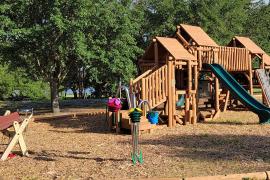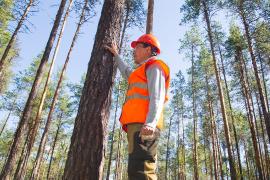Guest post by Diana K. Rice, RD
As a registered dietitian and staff member of The Kids Cook Monday, I’ve seen firsthand how efforts to involve children in food production and preparation can influence them to make healthy choices. Much of my work involves school-based efforts to teach these skills, but with all of the other academic learning objectives students must meet, I know that it can be difficult to find time during the school day to give kids truly enriching food-related experiences.
Camp, on the other hand, provides an ideal setting for the full farm-to-table (or campfire!) experience. I fondly recall cooking “stone soup” over the fire as a young camper and later, as a counselor. These experiences undoubtedly contributed to my current passion for home cooking, so I’ve been thrilled to discover the in-depth cooking and gardening experiences many camps currently offer to help children develop an appreciation for the food they eat every day. As one camper told Grant Bullard, the owner and director of Gwynn Valley Camp, “I never realized how much energy goes into making food!”
Located in Brevard, North Carolina, Gwynn Valley offers an array of unique food-related experiences to their overnight campers. “Campers who sign up for the farm activity help milk a cow or goat, pick and harvest a bounty of different vegetables, feed animals, and develop a sense of ownership that translates from farm to table,” Bullard says. Cooking is an integral part of the experience, as well. “There is no greater joy than to share a meal where you've had a part in its preparation,” Bullard says. “Campers can go by the farm the day of their camp out and pick items that they might want to include in their camp out meal.”
Bullard knows that providing his campers with these experiences does more than just fill their days. “Campers who have participated in food production and preparation develop an entirely different attitude,” he says. “We have many campers try their first green bean, tomato, or broccoli at camp simply because they spent time harvesting that food earlier in the day. As one mother wrote, ‘My children now want broccoli for dinner because they have seen it grow and they have picked it for their dinner at Gwynn Valley.’”
Stacey Antine, a registered dietitian who founded the organization HealthBarn USA, has noticed the same trend. “I started HealthBarn in 2005 as a call to action to the downward trend of children’s health based on lifestyle,” Antine says. HealthBarn offers year-round “farm-to-fork” programming, including summer camps at Abma’s Farm in Wyckoff, New Jersey and Hilltop Hanover Farm & Environmental Center in Yorktown Heights, New York. “I believe that hands-on education is an important part of the solution, and a farm is a great place to learn about how to live healthy and create the skills to sustain it!” Antine says.
Antine, who also offers Kids Cook Monday classes at HealthBarn during the school year, has her campers spend just as much time in the kitchen as they do in the garden. “All healthy recipes are family-friendly and kid-approved even for the pickiest of eaters,” she says. Through her programs, she’s noticed the same results as Bullard: “One mother told me, ‘I don’t know what you did, but my daughter is the worst eater. She only eats chicken nuggets and boxed mac ‘n’ cheese, but after your camp she’s making homemade raviolis!’”
Gwynn Valley and HealthBarn both operate on farms, but camps without farmland access can still offer their campers similar growing and cooking experiences. Ferncliff Camp in Little Rock, Arkansas, decided to implement a garden program in 2011. They cut costs and made the space environmentally friendly by using scrap materials to build it. Now, the garden is among the most enriching experiences they offer. “Seeing the wonder on a kid’s face when they pull a giant carrot out of the ground is priceless,” says associate director Joel Gill. “The food produced in the garden supplements our dining hall and there is a taste table where campers can taste what has been harvested each day.” Ferncliff campers also have the opportunity to cook muffins in solar ovens using eggs gathered from the property’s hen houses.
Some camps have even taken the initiative to offer their campers in-depth culinary programs. At Camp Towanda, an overnight camp located in the Pocono Mountains of Pennsylvania, campers can sign up for a variety of cooking classes, many of which use Kids Cook Monday recipes. “Our classes range from basic cooking, kitchen etiquette and safety to worldwide ethnic dishes,” says Mitch Reiter, the camp’s owner and director. “[We cover] yields, recipes, inventory control, logistics and of course, the joy of cooking. We have been told by our friends in the culinary world how impressed they are with our program!”
I believe any day a camper spends engaged in activities like these is a day well spent, but ultimately, the camp experience is about instilling children with lifelong passions and skills in a way that no other setting can. For a child who has come to know the joys and rewards of cooking at camp – or perhaps, for a child who may be in store such adventures this summer – it’s important for parents to demonstrate that these skills and experiences are integral to everyday life. Cooking dinner with your children at least once a week provides an ever-renewing opportunity to reinforce the connection between food, community and health they’ve discovered at camp. Visit TheKidsCookMonday.org for recipes and resources tailored to family cooking today!
Diana K. Rice is a registered dietitian on staff with The Kids Cook Monday, a project of The Monday Campaigns, an ACA Educational Ally. She credits her interest in food and cooking in part to the summers she spent at Camp Brighton Woods in Brookeville, Maryland.
Photo courtesy of HealthBarn USA, Wyckoff, New Jersey
The views and opinions expressed by contributors are their own and do not necessarily reflect the views of the American Camp Association or ACA employees.




